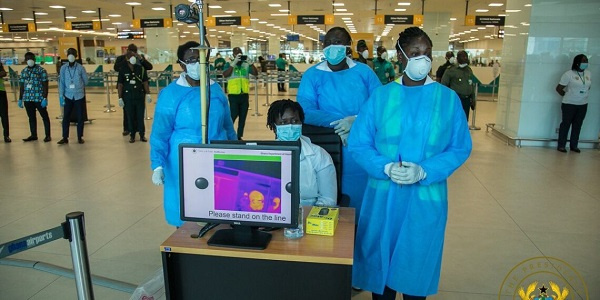The Food and Drugs Authority (FDA) has described as erroneous, claims that the COVID-19 testing of passengers at the Kotoka International Airport (KIA) is not reliable.
It says the “detection of the SARS-CoV 2 virus at the airport is not a rapid diagnostic test (RDT) kit but rather a device which detects the virus in nasopharyngeal (nasal) swabs.
The clarification by the Authority follows what it says are “inaccurate and unscientific” claims by one Dr. Kofi Bonney of the Noguchi Memorial Institute for Medical Research about the device being used for the testing at the airport.
In a statement, the FDA indicated that the device detects the ANTIGEN (SARS-CoV-2 Virus) by fluorescence technology.
According to the FDA, it gave market authorization to the device after a specificity and sensitivity comparison with the PCR tests.
It said the device met the requirements of not less than 99.0% concordance.
“The Food and Drugs Authority wishes to assure the public that the device approved for use at the KIA is fit for purpose and the Authority shall continue to monitor its performance in accordance with regulatory requirements”, parts of the statement said.
The Authority further outlined what it claimed were inaccurate statements made by Dr. Bonney and corrected them as follows:
1. The sensitivity of the device, being not less than 99.0% makes it statistically improbable for the claim that more than half of the test results will come out as false negative (people who are carrying the virus and are falsely reported not to be).
2. The specificity of the device, being also not less than 99.0% makes it highly improbable for test results to come out as false positive (people who are carrying other viruses to be classified as SARS-CoV-2) as being claimed. • The nasal specimens are not placed on paper but rather onto cartridges which are inserted into the device and the results displayed electronically on an LCD, which can be printed out from a computer.
3. The allusion to “tests done over the years” and all statistics given with reference to performance of RDTs in response to the accuracy of the Antigen test cannot be true for SARS-CoV-2, as the disease has not been around for that long for such data to have been gathered on RDT antigen.
4. Data available to the FDA on Antibody and Antigen RDTs from March 2020 to date shows that their sensitivity ranges from 4% – 62% and not 34%-80%. This is the reason why the FDA has not authorised any Antibody or Antigen RDT kits to date.
5.The misleading statement alleging that The WHO requires confirmation of a negative RDT test by a PCR test is inaccurate. This has also no relevance with respect to the specific antigen testing being done at the KIA as this uses a device which has been validated against PCR and found to be comparable and is not an RDT kit.
Source: citinewsroom.com


